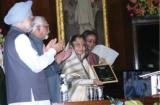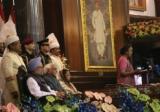Archives
60 YEARS of Indian Parliament
Manifold problems within the country and outside notwithstanding, the bicameral Indian Parliament comprising the Lok Sabha and the Rajya Sabha has survived .It is a great achievement indeed for over 1.25 billion people divided into several socio-religious communities. There is no reason why the parliamentary democracy will not survive for many more years proving the skeptics wrong. It is growing stronger and more vibrant despite the fact that many people with questionable credentials should not have been there. Our electoral process should be more transparent to ensure that more competent people dedicated to the public cause are elected to the country’s highest panchayat. As the outgoing President of India says, the nation’s record is remarkable as there is widespread acclaim about the tenacious manner in which India has adhered to democracy at a function held in the high doomed historic Central Hall. Outgoing President Pratibha Devising Patil, Lok Sabha Speaker Meira Kumar, Rajya Sabha Chairman M Hamid Ansari and Prime Minister Dr Manmohan Singh addressed the august gathering of MPs where four surviving Members of the first Lok Sabha were felicitated. They are former Manipur Chief Minister Rishang Keishang, now Rajya Sabha Member, Kandala Subrahmanyam, Reshamlal Jangade and K Mohana Rao.
 Democracies across the world are operating in complex situations. The demand for development programs is becoming louder. People are not sitting idle as they are articulating their hopes and aspirations vocally through various fora and divergent views on local, national and international issues are emerging almost daily. What is needed is to maintain a balance between the people’s ever increasing expectations and the legislatures as the President says.
Democracies across the world are operating in complex situations. The demand for development programs is becoming louder. People are not sitting idle as they are articulating their hopes and aspirations vocally through various fora and divergent views on local, national and international issues are emerging almost daily. What is needed is to maintain a balance between the people’s ever increasing expectations and the legislatures as the President says.
Voicing concern over malpractices in the system, she has rightly called for removing these from the electoral process. We can only hope that the Election Commission of India and the political class will take note of her valuable advice and initiate remedial measures.
It is indeed is a matter of pride that the august institution has debated and endorsed several very progressive legislations such as those related to the Right to Education, the Right to Information, the Right To Guaranteed Employment for the poor as well as the legislations ensuring gender equality, protection of life and livelihood of girls, women and other crucial legislations. These have provided social and economic opportunities for the Scheduled Castes, Scheduled Tribes, Other Backward Classes (OBCs) and Minorities.
Over the years, the Lok Sabha and the Rajya Sabha have also heard great and inspiring debates stirring the nation’s imagination and leading them to new paths. These speeches were sparkling with a sense of humour and witticism and malice towards none .The wisdom of thought of several Members in the past enlivened the nation and provided thoughtful points to the issues facing the country. But now …
 There is no denying the fact that there are several brilliant Parliamentarians who come prepared to make their points. However most of them find it difficult to complete their points of view as they are shouted at by their political opponents. Intolerance on the part of the members results in pandemonium leading to repeated adjournments of the scheduled proceedings. Who is responsible for the unruly behavior on the part of many intolerant members often instigated by the floor leaders? We should not be intolerant of others’ views. In a democracy, everybody should be allowed to have his or her say and one should be prepared to give a logical reply.
There is no denying the fact that there are several brilliant Parliamentarians who come prepared to make their points. However most of them find it difficult to complete their points of view as they are shouted at by their political opponents. Intolerance on the part of the members results in pandemonium leading to repeated adjournments of the scheduled proceedings. Who is responsible for the unruly behavior on the part of many intolerant members often instigated by the floor leaders? We should not be intolerant of others’ views. In a democracy, everybody should be allowed to have his or her say and one should be prepared to give a logical reply.
We have to revive this tradition of reasoned and constructive debates and discussion in Parliament on all issues facing the nation as Prime Minister Dr. Manmohan Singh has rightly said on this historic occasion. But will he be able to make a little effort to convince his party’s colleagues to be tolerant when members of non-ruling parties speak in the Lok Sabha and the Rajya Sabha? Very often, due to silly objections raised by the members of the Treasury Benches when opposition MPs speak noisy scenes are created. It should be noted that the ruling party or parties irrespective of their political leanings have greater responsibility to uphold democratic norms than others.
Unfortunately, the quality of debates is declining as a majority of the members come unprepared to speak about the subjects listed for the day. It is the Members of Parliament who individually and collectively can determine how effectively they can reflect the people’s growing aspirations to shape the nation’s destiny in the fast changing world. They themselves should rectify the lacunae in the Parliamentary system as it is the best form of governance. It must be strengthened since there is no alternative to democracy.

